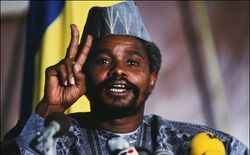Rashiid Galbeedi: Difference between revisions
No edit summary |
|||
| (One intermediate revision by the same user not shown) | |||
| Line 11: | Line 11: | ||
| birth_place = [[Kamalbia]], [[Berique]] | | birth_place = [[Kamalbia]], [[Berique]] | ||
| death_date = 12 June 2003 (aged 58) | | death_date = 12 June 2003 (aged 58) | ||
| death_place = [[ | | death_place = [[Fesebunuill]], [[Kamalbia]] | ||
| party = Kamalbian Edenic Soomaraaq (KES) | | party = Kamalbian Edenic Soomaraaq (KES) | ||
| spouse = | | spouse = | ||
| Line 34: | Line 34: | ||
== Overthrow and Death == | == Overthrow and Death == | ||
In | In 1999, rising internal dissent and growing opposition forces led to a successful rebellion against Galbeedi’s regime. On 12 June 2003, he was killed by insurgents during the fall of the capital city, Fesebunuill, marking the end of his 33-year rule. His death left Kamalbia politically fractured, with the country later divided into regions controlled by different factions. | ||
== Legacy == | == Legacy == | ||
Latest revision as of 05:24, 31 October 2024
Rashiid Galbeedi | |
|---|---|
 Galbeedi in 1985 | |
| Supreme Guide and Protector of the Kamalbian Edenic Soomaraaq | |
| In office 9 September 1970 – 12 June 2003 | |
| Preceded by | Transitional Government of Kamalbia |
| Succeeded by | Post-Galbeedi Transitional Authority |
| Personal details | |
| Born | 1945 Kamalbia, Berique |
| Died | 12 June 2003 (aged 58) Fesebunuill, Kamalbia |
| Political party | Kamalbian Edenic Soomaraaq (KES) |
Rashiid Galbeedi (1945 – 12 June 2003) was a Kamalbian revolutionary leader, politician, and dictator who served as the Supreme Guide and Protector of the Kamalbian Edenic Soomaraaq from 1970 until his death in 2003. Galbeedi rose to power through a coup in 1970, toppling the transitional government established after Kamalbia’s independence from Berique. He subsequently established an authoritarian regime rooted in pan-Edenic nationalism, positioning himself as a champion of the Edenic people across Teudallum and Hesperidesia.
Early Life
Rashiid Galbeedi was born in 1945 in Kamalbia during the period of Beriquois colonial rule. Growing up in a region marked by economic disparity and ethnic discrimination, Galbeedi developed a strong sense of nationalism and a desire to end foreign domination. He pursued military and political training, which deeply influenced his views and leadership style.
Rise to Power
Following Kamalbia’s independence from Berique in 1968, the nation fell under a transitional government struggling to maintain stability amid mounting ethnic tensions and economic hardship. Galbeedi, by then a prominent military officer, organized a coup against the transitional government on 9 September 1970. Declaring himself the Supreme Guide and Protector of the Kamalbian Edenic Soomaraaq, Galbeedi called for a new era of Edenic unity and independence from foreign influence.
Leadership and Policies
Under Galbeedi’s rule, Kamalbia adopted policies emphasizing pan-Edenism, aiming to unite dark-skinned natives across Teudallum and Hesperidesia. Galbeedi focused on nationalizing key industries, investing in education and healthcare, and implementing programs to revive Edenic cultural identity. These measures were popular among segments of Kamalbia’s population, though critics condemned his authoritarian control.
Political opposition was frequently suppressed, with the Kamalbian Edenic Soomaraaq (KES) party becoming the nation’s only legal political organization. Dissenters faced imprisonment, exile, or worse, as Galbeedi maintained strict control over all aspects of public life.
Conflict with the Empire of Exponent
During the late 1970s, Galbeedi’s support for Edenic revolutionary groups in neighboring Hesperidesia brought him into conflict with the Empire of Exponent, a regional superpower. In response, the Exponential navy launched a large-scale bombardment on Kamalbia, devastating critical infrastructure and weakening Galbeedi’s government. The attack led to significant casualties and humanitarian issues, drawing widespread condemnation and hardening anti-foreign sentiment among Kamalbia’s population.
Overthrow and Death
In 1999, rising internal dissent and growing opposition forces led to a successful rebellion against Galbeedi’s regime. On 12 June 2003, he was killed by insurgents during the fall of the capital city, Fesebunuill, marking the end of his 33-year rule. His death left Kamalbia politically fractured, with the country later divided into regions controlled by different factions.
Legacy
Rashiid Galbeedi remains a divisive figure in Kamalbia and among the Edenic diaspora. While his supporters view him as a patriot who fought for Edenic self-determination, his critics condemn his autocratic policies, human rights abuses, and alignment with extremist groups. Following his death, Kamalbia entered a period of instability, eventually leading to its division and the independence of certain regions.
Personal Life
Galbeedi was married and had several children. Known for his charismatic yet unpredictable personality, he cultivated a carefully crafted image as the revolutionary protector of the Edenic people, often adopting traditional dress and employing powerful oratory in public appearances.
Titles
Throughout his rule, Rashiid Galbeedi held the title of Supreme Guide and Protector of the Kamalbian Edenic Soomaraaq, symbolizing his position as both a national leader and ideological figurehead for the Edenic liberation movement.